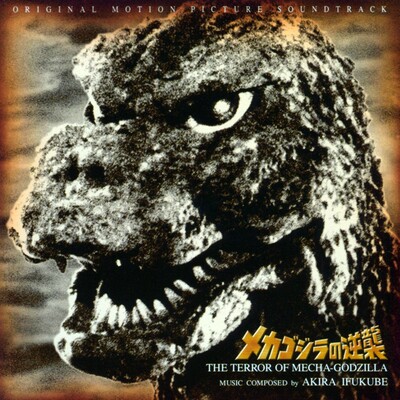
The Terror Of MechaGodzilla (Original Motion Picture Soundtrack)
Year Movie Released in Japan: 1975 Year Movie Released in U.S.: 1977 The 1970s were bleak years for Tohos monster films, particularly the original GODZILLA series. Increasingly juvenile plots precipitated a sharp decline in the franchises popularity, which in turn resulted in drastic budget cuts. With their shoddy special effects and a surplus of stock footage, the films became almost painful to watch - at least in the eyes of older fans. By 1975 the series had mercifully run its course, though not before Toho had made one last desperate attempt to save it - in the form of TERROR OF MECHAGODZILLA. For the 15th Godzilla installment Toho brought back original director Ishiro Honda, as well as G-composer extraordinaire, Akira Ifukube. The maestro had all but retired from film scoring, having produced a mere handful of soundtracks since the late 60s (in more prolific times he routinely churned out ten or more scores a year). Ifukube hadnt composed an original Godzilla score since 1968s DESTROY ALL MONSTERS, though his association with the series had a lasting impact (1972s GODZILLA VS. GIGAN was dominated by recycled Ifukube music). Despite the maestros participation, the score for TERROR OF MECHAGODZILLA pales in comparison to such immortal 60s classics as KING KONG VS. GODZILLA and GODZILLA VS. THE THING. The TERROR score is relatively short and quite repetitious, relying on just a few basic themes to carry the action. Considering Tohos dire financial situation in 1975, it is unlikely that Ifukube was given enough time or money to create a masterpiece. Nevertheless, the score does feature a few memorable moments, particularly the films "Main Title" (Track 1), arguably one of the most stirring of the entire series. Clocking in at a generous four-and-a-half minutes, it is far longer than the opening music of any previous Godzilla film, and a seamless representation of the scores three primary themes. It begins with the sound of a softly struck gong and steady military drumbeat, mixed with swirling synthesizer effects. A new, hauntingly powerful theme for MechaGodzilla soon emerges, followed by a slower, more regal version of the original 1954 Godzilla theme. Then comes another new, wonderfully elaborate motif - the mournful theme for Titanosaurus (a peaceful monster who is forcibly controlled by an evil scientist). The cue repeats each theme once more in sequence, and then closes with a final reading of the MechaGodzilla theme. Unfortunately the three monster motifs are endlessly reprised, either individually or in tandem, throughout the score. While they are certainly strong themes, the frequent repetition dilutes their impact. Other than a couple of somber, church-like organ passages (Tracks 4 and 9) and some incidental music (most of it based on the Titanosaurus theme), the soundtrack offers little relief from the monotony. Thankfully the "Ending" (Track 26), one of Ifukubes typically majestic closing compositions, is a worthy finale. The "Perfect Box" version of TERROR OF MECHAGODZILLA offers few improvements over the 1993 Futureland edition (TYCY-5359). The sound quality is only slightly enhanced, and bonus material is scarce. At first glance Tracks 16 and 25 appear to be newly released cues, but they are actually just edited versions of Tracks 7 and 21. Meanwhile, the true bonus tracks (27 and 28) are simply alternate takes of Track 2 and the "Ending". As mentioned elsewhere on this site, the "Perfect Box" collections offer fans a convenient way to build a comprehensive library of Godzilla soundtracks. While Box 3 is undoubtedly the weakest group of Showa Series scores (fans of the 70s films may dispute this), it features enough quality material to satisfy casual enthusiasts as well as diehard fans.
